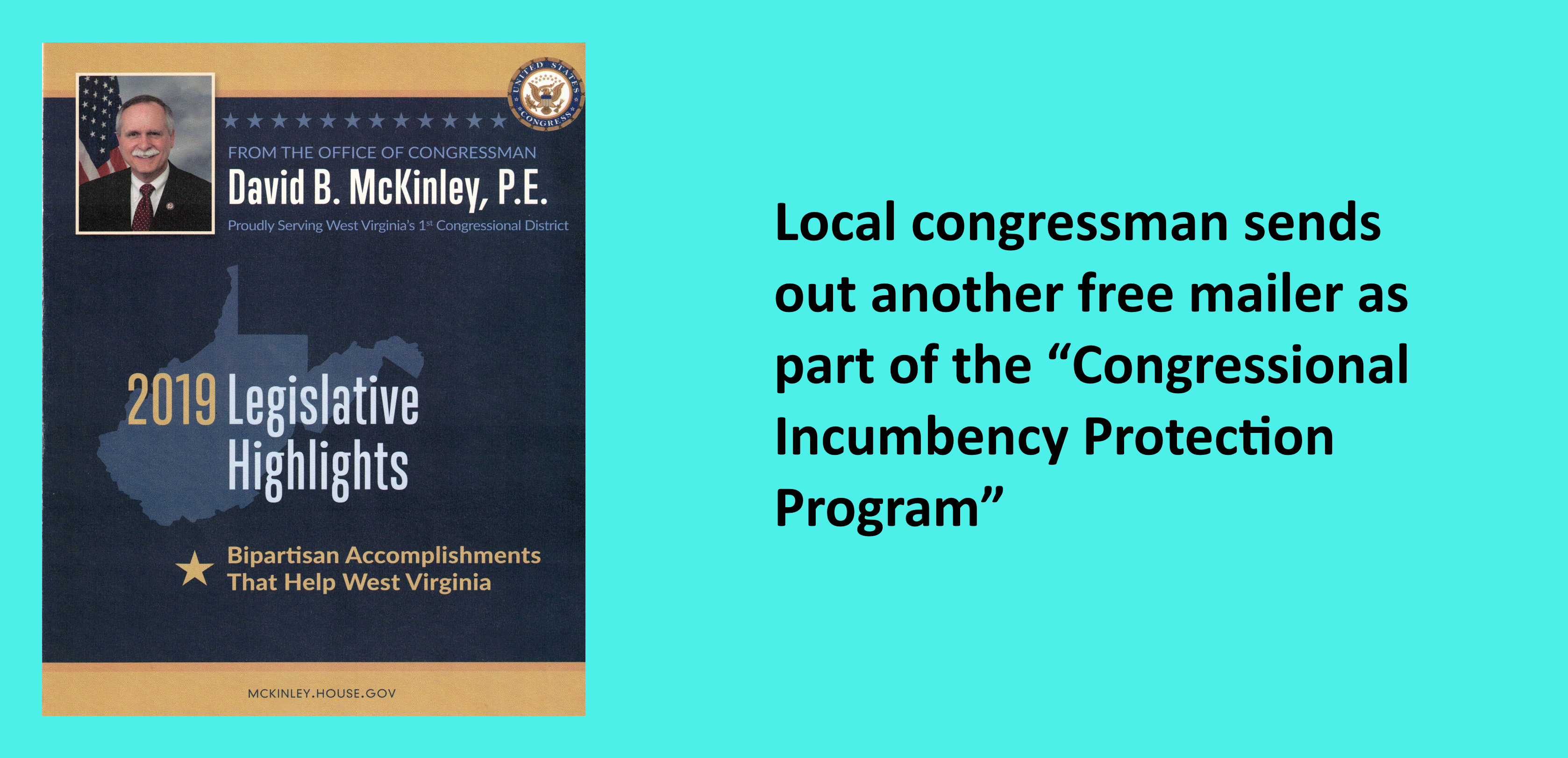More hypocrisy from Congressman David McKinley
A look at franking and earmarks

Franking hypocrisy
Franking is the “privilege of sending mail without payment of postage” that allows members of congress to send mail about government business without paying for it.
Last month, I described how our local congressman, David McKinley, made term limits a part of “The McKinley Plan for Congressional Reform” back in 2010 when he first ran for Congress. Of course, we haven’t heard McKinley say anything about term limits since then. But that wasn’t the only empty pledge found in the “McKinley Plan.” Another promise (#3 to be exact) found in his plan dealt with the congressional franking privilege. Here’s what McKinley pledged to the electorate in order to “End Taxpayer-funded Campaigning”:
David McKinley believes that it’s wrong to abuse taxpayer money by funding campaign-style “constituent” mailings and phone calls during re-election years.
David will sponsor legislation to place greater restrictions on the timing and types of communications sent with taxpayer money.
Once McKinley was elected in 2010, he didn’t just ignore his pledge by continuing the practice -- he quickly became one of the House’s top ten franking abusers. From the Council for Citizens Against Government Waste:
Ironically, several House GOP freshmen who campaigned heavily against government waste and excess have racked up some of the highest mailing bills through their use of the franking privilege. A June 19, 2012 Roll Call article reported that eight of the ten House members who spent the most on franked mail between April 1, 2011 and March 31, 2012 were Republicans. Four of these Republicans are freshmen who specifically criticized their incumbent competitors for using (and, in some cases, allegedly abusing) the franking privilege. Representatives Frank Guinta (R-N.H.), Joe Heck (R-Nev.), David McKinley (R-W.Va.), and Bobby Schilling (R-Ill.) spent a combined $1.36 million on franked mail between April 2011 and March 2012.
Not bad for a freshman congressman who ran on a platform of ending the practice. I could not find a more recent list of franking abusers but it’s clear from the quality of his most recent mailing that he is not sparing any expense. (Also note that McKinley promised to end phone calls. Someone must be imitating him because I periodically get a phone call from a “Congressman McKinley” wanting to know if I want to participate in a phone conference with the congressman.)
Term limits was #1 and ending franking was #3. What was McKinley’s #2 promise back in 2010?
Answer: McKinley pledged “No More Earmarks.”
David refused to insert earmarks into legislation as a member of the West Virginia House of Delegates and he will carry this precedent into Washington by proposing legislation to ban any federal earmarks not related to national security.
Okay, what’s an earmark? Slate explains:
In general, the word “earmark” refers to any element of a spending bill that allocates money for a very specific thing—a given project, say, or location, or institution. For example, if Congress passed a budget that gave a certain amount of money to the National Park Service as a whole, no one would consider it an earmark. But if Congress added a line to the budget specifying that some of that money must go toward the preservation of a single building—definitely an earmark.
This is from McKinley’s list of legislative accomplishments in his mailing:
This year’s National Defense Authorization Act included McKinley’s Amendment regarding domestic sourcing of dinnerware. The amendment will help American manufacturers of dinnerware, such as that produced at Homer Laughlin China in Newell, W.V.
At the time, here is how the National Taxpayers Union described what happened:
Among proposed amendments to the NDAA are one to require the Department of Defense to use U.S.-made flatware and another to require domestic sourcing for dinner ware within the Department of Defense.
These amendments have nothing to do with U.S. defense needs, but instead are designed to benefit politically connected businesses.
The flatware amendment was submitted by Rep. Claudia Tenney (R-NY), who noted: “Our district is the proud home to Sherrill Manufacturing, the only flatware manufacturer producing 100 percent Made in America flatware.” The dinnerware amendment was submitted by Rep. David McKinley (R-WV), whose district includes the largest domestic tableware manufacturer in the United States.
(Rollcall calls this a "backdoor earmark.")
My hunch is that McKinley would point out that he did allow for national defense earmarks in his 2010 promise. I’m having a hard time seeing, however, how dinner plates relate to keeping the country safe; the ranking Republican member on the House Armed Services Committee, Mac Thornberry, would appear to agree with me:
“I have yet to hear a national security justification to dictate where DOD buys its knives and forks and spoons and plates,” the Texas Republican said.
Note -- The “Congressional Incumbency Protection Program” in my graphic is how Common Cause Pennsylvania Barry Kaufmann describes franking.